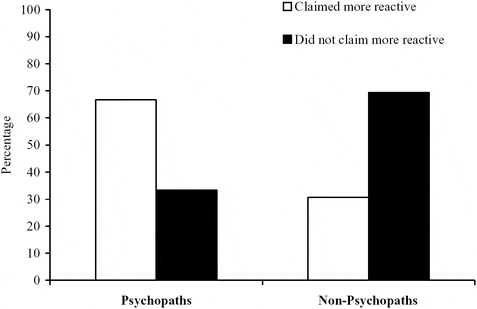Psychopath Assessment Test
3 Min Free Psychopath Assessment Test
Who Can Benefit From This Psychopath Assessment Test?
This psychopath assessment test can be beneficial for individuals who are interested in assessing their level of psychopathic traits or tendencies. Psychopathy is a personality disorder characterized by a lack of empathy, manipulative behavior, and a disregard for social norms and rules.
Individuals who are concerned about their level of psychopathic traits or tendencies, or who have been referred for assessment by a mental health professional, may find this test particularly helpful in identifying potential areas of concern. Additionally, those who are interested in personal growth and development may find the results of this test useful for identifying strategies to manage or reduce psychopathic tendencies.

Psychopath Assessment Test Accuracy

The accuracy of a psychopath assessment test can vary depending on several factors, including the specific test used, how the test is administered, and the individual taking the test.
Psychopath assessment tests are designed to assess various aspects of psychopathic traits, such as lack of empathy, impulsivity, and antisocial behavior. While these tests can provide a useful starting point for individuals who want to assess their level of psychopathic traits, it’s important to recognize that no single test can fully capture all aspects of psychopathy.
Additionally, it’s important to consider that self-report measures, such as psychopath assessment tests, may be influenced by factors such as social desirability bias, meaning that individuals may respond in a way that they think is socially desirable rather than providing accurate information about their true thoughts and behaviors.
Types of Psychopath Assessment Test
Hare Psychopathy Checklist (PCL-R):
This is a widely used psychopathy assessment tool that measures the presence of psychopathic traits based on a clinical interview and a review of available records.
Levenson Self-Report Psychopathy Scale (LSRP):
This is a self-report measure that assesses psychopathic traits based on the individual’s own perceptions and behaviors.
Psychopathic Personality Inventory (PPI):
This is a self-report measure that assesses various aspects of psychopathy, including fearlessness and impulsivity.
Personality Assessment Inventory (PAI):
This is a personality assessment tool that includes a subscale for assessing antisocial personality disorder, which is closely related to psychopathy.
Millon Clinical Multiaxial Inventory (MCMI):
This is a personality assessment tool that includes a subscale for assessing antisocial personality disorder, which is closely related to psychopathy.
Minnesota Multiphasic Personality Inventory-2 Restructured Form (MMPI-2-RF):
Includes a subscale for assessing antisocial personality disorder, which is closely related to psychopathy.
Treating Issues related to Psychopathy
Treating issues related to psychopathy can be complex and often requires a multidisciplinary approach involving various professionals. The focus of treatment may vary depending on the individual’s specific needs and underlying issues, but some common strategies may include:
- Therapy: Psychotherapy, such as cognitive-behavioral therapy (CBT), can be effective in treating issues related to psychopathy. CBT can help individuals develop skills for managing impulsivity and aggression, improve emotional regulation, and address interpersonal difficulties.
- Medication: Medications, such as antipsychotic or mood stabilizing drugs, may be used in some cases to manage symptoms related to psychopathy, such as aggression or impulsivity.
- Behavioral interventions: Behavioral interventions, such as contingency management or behavior modification techniques, can help individuals learn new behaviors and develop more adaptive ways of coping.
- Supportive services: Supportive services, such as vocational or educational support, can help individuals develop skills and gain independence.
- Family and social support: Developing positive relationships with supportive individuals, such as family members or friends, can help improve outcomes and reduce risk of relapse.

